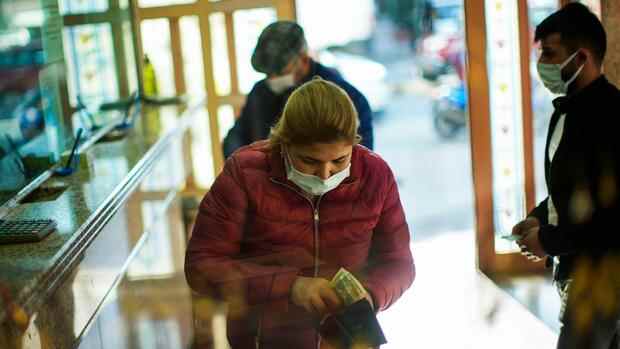A customer has exchanged Turkish lira for dollars. Turkey’s national currency has come under enormous pressure compared to the US dollar or the euro.
(Photo: dpa)
Istanbul The Turkish central bank lowered its key interest rate again despite high inflation and the currency crisis. The currency authorities announced on Thursday that it will be reduced from 15 percent to 14 percent.
Economists had expected this after the central bank had eased its monetary policy several times since September. The inflation rate is currently already more than 21 percent – well above the central bank’s target of five percent.
According to the almost unanimous opinion of economists, higher interest rates would actually be necessary to counteract this. However, President Recep Tayyip Erdogan has repeatedly called himself an “interest enemy”.
The Turkish head of state wants to boost the economy with cheap money. After the decision was announced, the lira fell to a record low of 15.5 against the US dollar. The central bank has now signaled to interrupt the easing cycle in order to observe the effects over the next three months.
Top jobs of the day
Find the best jobs now and
be notified by email.
The interest rate cuts are one reason for the continuing decline in the lira, which has lost around half of its value against the dollar this year.
The weakness of the lira is fueling inflation
The central bank has therefore intervened on the foreign exchange market several times in the past few days: Because of “unhealthy pricing”, it sold dollars to support its own currency. The weakness of the lira, in turn, is fueling inflation as imports such as oil and medicines become more expensive.
The collapse of the currency has meanwhile also worried the German economy. “Because this makes goods from abroad more expensive, demand in Turkey is reduced and German exports suffer,” said the president of the BGA foreign trade association, Dirk Jandura.
Exports to Turkey fell by 30 percent in August. Above all, export goods such as machines, cars and auto parts as well as chemical products are affected.
Central bank is losing its reputation
Germany is the most important trading partner and one of the largest foreign investors in Turkey: in 2020 the bilateral trade volume was 36.6 billion euros.
The central bank has rapidly lost its reputation among investors.
President Erdogan contributed to this by repeatedly calling for interest rate cuts and killing three central bank governors within two and a half years, which calls into question the independence of the monetary authorities.
More: German economy is experiencing a slump in exports and fears bankruptcies in Turkey
